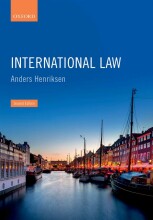Sources of international law - Conventions (treaties) as a legal source
3 important questions on Sources of international law - Conventions (treaties) as a legal source
Art 2 (1)(c) 'full powers'
Art 19: states that states may always formulate reservations unless
art 6: every state possesses capacity to conclude treaties.
Their are two cumulative conditions for customary international law:
- the practice could be virtually uniform
- there are no rules as to how much time it takes for a custom to become customary international law
- statements of states that are most affected by the custom, carry more weight in figuring if something is customary international law
2) opinio iuris sive necessitates
a general recognition by states that the practice is settles enough to amount to an obligation binding on states in international law
- states need to feel legal obligation, not political incentive.
The question on the page originate from the summary of the following study material:
- A unique study and practice tool
- Never study anything twice again
- Get the grades you hope for
- 100% sure, 100% understanding
































